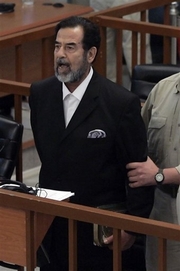Saddam Gets Death
 An Iraqi court on Sunday sentenced Saddam Hussein to the gallows for crimes against humanity, closing a quarter-century-old chapter of violent suppression in this land of long memories, deep grudges and sectarian slaughter.
An Iraqi court on Sunday sentenced Saddam Hussein to the gallows for crimes against humanity, closing a quarter-century-old chapter of violent suppression in this land of long memories, deep grudges and sectarian slaughter.The former Iraqi dictator and six subordinates were convicted and sentenced for the 1982 killings of 148 people in a single Shiite town after an attempt on his life there. Shiites and Kurds, who had been tormented and killed in the tens of thousands under Saddam's iron rule, erupted in celebration — but looked ahead fearfully for a potential backlash from the Sunni insurgency that some believe could be a final shove into all-out civil war.
The nine-month trial had inflamed the nation, and three defense lawyers and a witness were murdered in the course of its 39 sessions. With justice for Saddam's crimes done, the U.S.-backed Shiite prime minister called for reconciliation and delivered the most eloquent speech of his five months in office.
The verdict placed on the heads of the former regime does not represent a verdict for any one person. It is a verdict on a whole dark era that was unmatched in Iraq's history. The White House praised the Iraqi judicial system and denied the U.S. had been "scheming" to have the historic verdict announced two days before American midterm elections, widely seen as a referendum on the Bush administration's policy in Iraq.
President Bush called the verdict "a milestone in the Iraqi people's efforts to replace the rule of a tyrant with the rule of law. But symbolic of the split between the United States and many of its traditional allies over the Iraq war, many European nations voiced opposition to the death sentences in the case, including France, Italy, the Netherlands, Spain and Sweden. A leading Italian opposition figure called on the continent to press for Saddam's sentence to be commuted to life imprisonment.
Lost in the drama of Sunday's death sentence was any mention of the failed search for the alleged weapons of mass destruction that Bush said led the United States to invade and occupy Iraq in March 2003. Saddam was found hiding with an unfired pistol in a hole in the ground near his home village north of Baghdad in December 2003, eight months after he fled the capital ahead of advancing American troops.
Twenty-two months later, he went on trial for ordering the torture and murder of nearly 150 Shiites from the city of Dujail. Saddam said those who were killed had been found guilty in a legitimate Iraqi court for trying to assassinate him in 1982. Ibrahim, Saddam's half brother and intelligence chief during the Dujail killings, was sentenced to join the former leader on the gallows, as was Awad Hamed al-Bandar, head of Iraq's Revolutionary Court, which issued the death sentences against the Dujail residents. Iraq's former Vice President Taha Yassin Ramadan was convicted of premeditated murder and sentenced to life in prison
Three defendants were given up to 15 years in prison for torture and premeditated murder. Abdullah Kazim Ruwayyid and his son, Mizhar Abdullah Ruwayyid, were party officials in Dujail, along with Ali Dayih Ali. They were believed responsible for the Dujail arrests. A local Baath Party official Mohammed Azawi Ali, was acquitted for lack of evidence.
A trial envisioned to heal Iraq's deep ethnic and sectarian wounds appeared rather to have deepened the fissures. The death sentences automatically go to a nine-judge appeals panel, which has unlimited time to review the case. If the verdicts and sentences are upheld, the executions must be carried out within 30 days.
A court official told The Associated Press that the appeals process was likely to take three to four weeks once the formal paperwork was submitted. If the verdicts are upheld, those sentenced to death would be hanged despite Saddam's second, ongoing trial for allegedly murdering thousands of Iraq's Kurdish minority.
Saddam's Sunni supporters, the bulk of the insurgency that has killed the vast majority of American troops in Iraq, could still explode in violence once an open-ended curfew is lifted in coming days. But the former leader's chief lawyer, Khalil al-Dulaimi, told The Associated Press his client had called on Iraqis to reject violence and refrain from taking revenge on U.S. invaders.
U.S. Ambassador Zalmay Khalilzad issued a statement saying the verdicts "demonstrate the commitment of the Iraqi people to hold them accountable. ... closing the book on Saddam and his regime is an opportunity to unite and build a better future."
U.S. officials who advised the tribunal on standards of international justice said Saddam's repeated courtroom outbursts may have played a key part in the convictions. They cited his admission in a March 1 hearing that he had ordered the trial of the 148 Shiites, insisting that was legal because they had conspired to kill him.
"Where is the crime? Where is the crime?" Saddam asked the five-judge panel then
"Where is the crime? Where is the crime?" Saddam asked the five-judge panel then
Later in the same session, he argued that his co-defendants must be released and that because he was in charge, he alone must be tried. His outburst came a day after the prosecution presented a presidential decree with a signature they said was Saddam's approval for death sentences, their most direct evidence against him.
About 50 of those sentenced by the Revolutionary Court died during interrogation before they could be executed. Some of those hanged were children.
About 50 of those sentenced by the Revolutionary Court died during interrogation before they could be executed. Some of those hanged were children.
The United States has denied direct involvement in the trial, but some legal observers believe it was tainted by association with the American presence.

0 Comments:
Post a Comment
<< Home